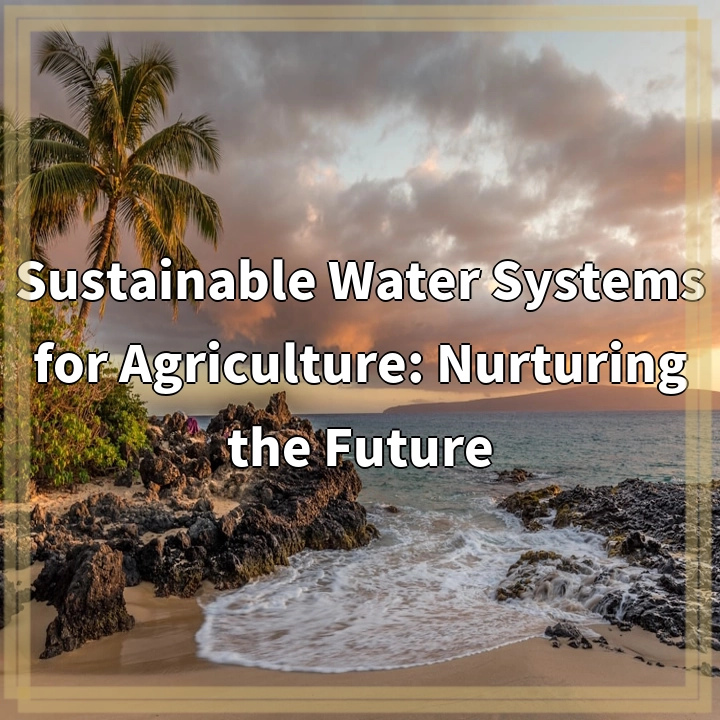
What is Sustainable Water Systems for Agriculture?
Sustainable water systems for agriculture entail implementing methods and practices that prioritize the efficient use and conservation of water resources. It involves adopting strategies that promote long-term environmental and economic sustainability while meeting the water needs of agricultural activities.
Real-World Problems Associated with Sustainable Water Systems for Agriculture
Despite the importance of sustainable water systems for agriculture, several challenges hinder their widespread adoption. Understanding these problems is crucial in developing effective solutions.
1. Water scarcity
The scarcity of water resources is a major concern for sustainable agriculture. With increasing global population and climate change impacts, water scarcity is becoming more prevalent in many regions. Limited water availability creates difficulties in establishing and maintaining sustainable water systems for agriculture.
2. Inefficient irrigation practices
Conventional irrigation methods often result in water wastage due to inefficiencies. Inefficient irrigation practices can lead to excessive evaporation, runoff, and overwatering, which not only deplete water resources but also contribute to soil degradation and contamination.
3. Environmental degradation
Unsustainable water management in agriculture can have detrimental effects on the environment. Excessive water extraction from rivers, streams, and groundwater sources can deplete water bodies, disrupt ecosystems, and harm aquatic habitats and wildlife. Additionally, chemical runoff from agricultural fields can pollute water sources, further degrading the environment.
4. Lack of infrastructure and resources
In some regions, the lack of proper infrastructure and resources hampers the implementation of sustainable water systems for agriculture. Inadequate irrigation infrastructure, limited access to water-saving technologies, and limited financial resources make it difficult for farmers to adopt sustainable practices.
5. Economic viability
Transitioning to sustainable water systems in agriculture can often be financially challenging for farmers. The initial investment required to implement water-saving technologies and infrastructure may pose a significant barrier, particularly for small-scale and resource-limited farmers. The lack of economic incentives and support mechanisms further hinder the adoption of sustainable practices.
6. Lack of awareness and education
Many farmers are unfamiliar with the benefits and techniques of sustainable water systems for agriculture. Limited awareness and education regarding water conservation practices and technologies restrict the widespread adoption of sustainable methods. Enhancing awareness and providing training programs are crucial in encouraging farmers to embrace sustainable water systems.
In conclusion, sustainable water systems for agriculture offer numerous benefits, but several real-world problems need to be addressed for their successful implementation. By addressing water scarcity, improving irrigation practices, mitigating environmental degradation, investing in infrastructure, providing economic incentives, and promoting awareness and education, we can nurture a more sustainable future for agriculture.

Solutions to Real-World Problems in Sustainable Water Systems for Agriculture
Addressing the challenges associated with sustainable water systems for agriculture requires the implementation of effective solutions. Here are some solutions that can help overcome these problems:
1. Water-efficient irrigation techniques
Adopting water-efficient irrigation techniques, such as drip irrigation and precision irrigation, can minimize water wastage and improve water use efficiency in agriculture.
2. Water management strategies
Implementing proper water management strategies, such as water recycling and rainwater harvesting, can help alleviate water scarcity issues and reduce reliance on conventional water sources.
3. Sustainable farming practices
Encouraging the use of sustainable farming practices, such as conservation tillage and crop rotation, can enhance soil health and reduce water requirements, thereby contributing to efficient water use in agriculture.
4. Investments in infrastructure
Investing in irrigation infrastructure, such as upgrading canals and irrigation systems, can improve water distribution efficiency and enable farmers to access water resources more effectively.
5. Financial incentives and support
Providing financial incentives, subsidies, and support programs to farmers can help alleviate the economic burden associated with transitioning to sustainable water systems. This can encourage wider adoption of sustainable practices.
6. Education and awareness
Enhancing education and awareness programs for farmers and the wider community can promote the importance and benefits of sustainable water systems for agriculture. This can help overcome the lack of knowledge and encourage behavior change.
By implementing these solutions, it is possible to address the real-world problems associated with sustainable water systems for agriculture. The collective effort of farmers, policymakers, and stakeholders can lead to a more sustainable and resilient agricultural sector.















